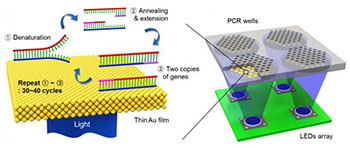
The ultrafast photonic PCR using LED lights under a thin gold film to amplify genetic samples. Credit: Jun Ho Son, UC Berkeley
Polymerase chain reaction (PCR) assays are one of the most common and useful diagnostic tools in genetics. A typical PCR run takes at least an hour, but bioengineers at the University of California, Berkeley (USA), are using light emitting diode (LED) arrays to rapidly heat and cool DNA samples, reducing processing time to minutes (Light Sci. App., doi: 10.1038/lsa.2015.53). This ultrafast photonic PCR method also requires less energy and space than traditional PCR assays. The researchers say their setup could provide accessible and portable on-chip DNA diagnostics for many applications, including precision and personalized medicine, agricultural science, forensic science and environmental science.
A PCR assay takes a trace amount of DNA in solution and amplifies it thousands or millions of times. Repeated heating and cooling cycles (typically 30 thermal cycles per assay) separate the double-stranded DNA, allowing the single strands to be bound to a matching primer and replicated. It can take an hour or longer to complete the 30 thermal cycles usually needed for amplification. The time required for heating and cooling the DNA solution, combined with the high cost and power requirements for the heater, make traditional PCR assays impractical for point-of-care diagnostics.
The UC Berkeley team’s PCR system speeds up heating and cooling cycles with the help of plasmonics. Gold thin films are deposited onto a plastic chip with several microfluidic wells filled with DNA in solution (see image). Light from a low-power, 3.5-W LED array beneath the films excites electrons on the gold thin films, which generates heat and warms the DNA solution. When the array is turned off, the gold electrons stop generating heat and the DNA solution rapidly cools. During experiments, the bioengineers found that their photonic PCR setup was able to complete 30 thermal cycles (from 55 °C to 95 °C) in less than five minutes—much shorter than the hour or more needed for traditional PCR. They also found that their ultrafast photonic PCR method was able to amplify DNA as well as conventional PCR tests.
Luke Lee, coauthor and professor of bioengineering at Berkeley, says the photonic PCR system would be ideal for ultrafast point-of-care on-chip genomic diagnostics that could be used almost anywhere, from rural areas to emergency rooms.
